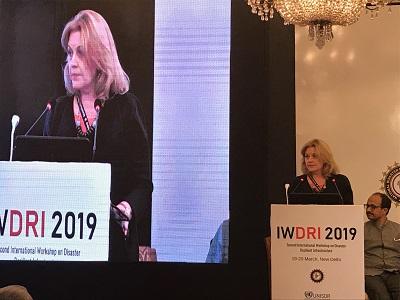
Loretta Hieber Girardet, head of the UN Office for Disaster Risk Reduction Regional Office for Asia-Pacific, speaking at the closing ceremony today in New Delhi
By Denis McClean
NEW DELHI, 20 March, 2019 - Agreement was reached today among experts and representatives from 33 countries to establish a Coalition for Disaster Resilient Infrastructure (CDRI) against the backdrop of the destruction of the Mozambique port city of Beira, home to 500,000 people.
“The loss of life and the displacement of hundreds of thousands of people from towns and cities across Southern Africa over the last five days underlines the urgency of investing in resilient infrastructure for low and middle income countries and not just high income countries.
“Resilience to disasters must be affordable for anyone exposed to an earthquake or an extreme weather event like Cyclone Idai,” said Loretta Hieber Girardet, head of the UN Office for Disaster Risk Reduction Regional Office for Asia-Pacific.
“When infrastructure fails, disaster follows. It is clear from the discussions that we have had here this week that the Sustainable Development Goals will not be reached if we do not invest in resilient infrastructure,” said Kamal Kishore on behalf of India’s National Disaster Management Authority (NDMA), co-organiser with UNISDR of the 2nd International Workshop on Disaster Resilient Infrastructure (IWDRI) which concluded today.
“When we lose hospitals, schools, roads, railways, airport, electricity supply and telecommunications in disasters the result is a major setback for eradicating poverty and achieving sustainable development,” he added.
The workshop participants took note of the fact that infrastructure losses from disasters and climate events are escalating worldwide. At the same time, an unprecedented growth of investment in infrastructure sectors is expected in the coming years.
The Outcome Document states that “climate change will add another level of complexity and uncertainty in the development of infrastructure systems for the long term. It will also pose multiple challenges in the adaptation of existing systems. The infrastructure systems of the 21st century are unprecedented not only in terms of scale but also in terms of their local to global interconnectedness. Infrastructure system disruptions in one location can now disrupt global supply chains, creating impacts that are difficult to predict.”